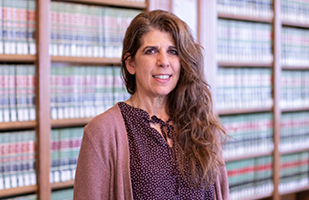Longtime Leader in Criminal Justice Reform Retires

Sara Andrews retires as the Criminal Sentencing Commission director after 32 years in public service.

Sara Andrews retires as the Criminal Sentencing Commission director after 32 years in public service.
Sara Andrews has spent her career tackling challenging situations as the director of the Ohio Criminal Sentencing Commission (OCSC) and for 24 years with the Ohio Department of Rehabilitation and Correction (ODRC). Addressing and resolving issues are in her nature.
“Whether it was something with my friends, in student council, or my sorority in college, I always had the initiative to take charge and say, ‘Let’s fix it. Let’s make it work,’” said Andrews.
After 32 years in public service and many leadership roles, Andrews has retired. Her work with the OCSC over the last eight years elevated the commission’s position as a resource to develop and recommend sentencing policy.
“I applied for the job because the commission is so uniquely positioned to impact people's lives through criminal justice information and policy,” said Andrews. “We’re a service that drives people to have discussions about a very complex system, and when representatives from the executive, legislative, and judicial branches come together, the objective is to find what we agree on and work through what we don’t.”
The commission was created in 1990 through legislation as an intermediary for statewide partners to enhance justice and fair sentencing in Ohio. The body consists of 31 members to share information from all stakeholder perspectives and ensure the diverse voices in the state justice system – including lawyers, judges, legislators, law enforcement, corrections officials, and behavioral health professionals – are represented.
“We’ve put together some good, credible work groups that did some great work to make bail and pre-trial hearings fairer and more consistent. We have also made really good progress with rights restoration and record sealing so that people who reenter society aren’t having past offenses prevent them from building fulfilling lives,” said Andrews.
Before her time with the sentencing commission, Andrews worked her way from a parole officer to ODRC’s deputy director for parole and community services. She went from making sure former inmates were following the conditions of their release individually to overseeing the work done across the state. She supervised the Ohio Parole Board, the Offices of Offender Reentry and Victim Services, and the inspection of jails. Those responsibilities included managing 600 employees and a $200 million budget.
With the position came a lot of travel and getting to know each operation. That list includes the 27 state prisons, three juvenile facilities, and many programs to restore the lives of victims and offenders. It was important for her to see the processes of each institution to help remove the complexities within the prison and reentry systems. She took that approach with her to the criminal sentencing commission.
“The goal is for us to understand how and why things happen. If we can't, then we need to fix it,” Andrews said.
She saw each issue as an opportunity to improve outcomes and lives. She experienced it as a frontline worker, decisionmaker, and facilitator across the state.
“The work we do is bigger than one person and there’s always a need for people to help drive those conversations,” Andrews said.


